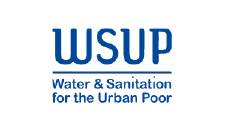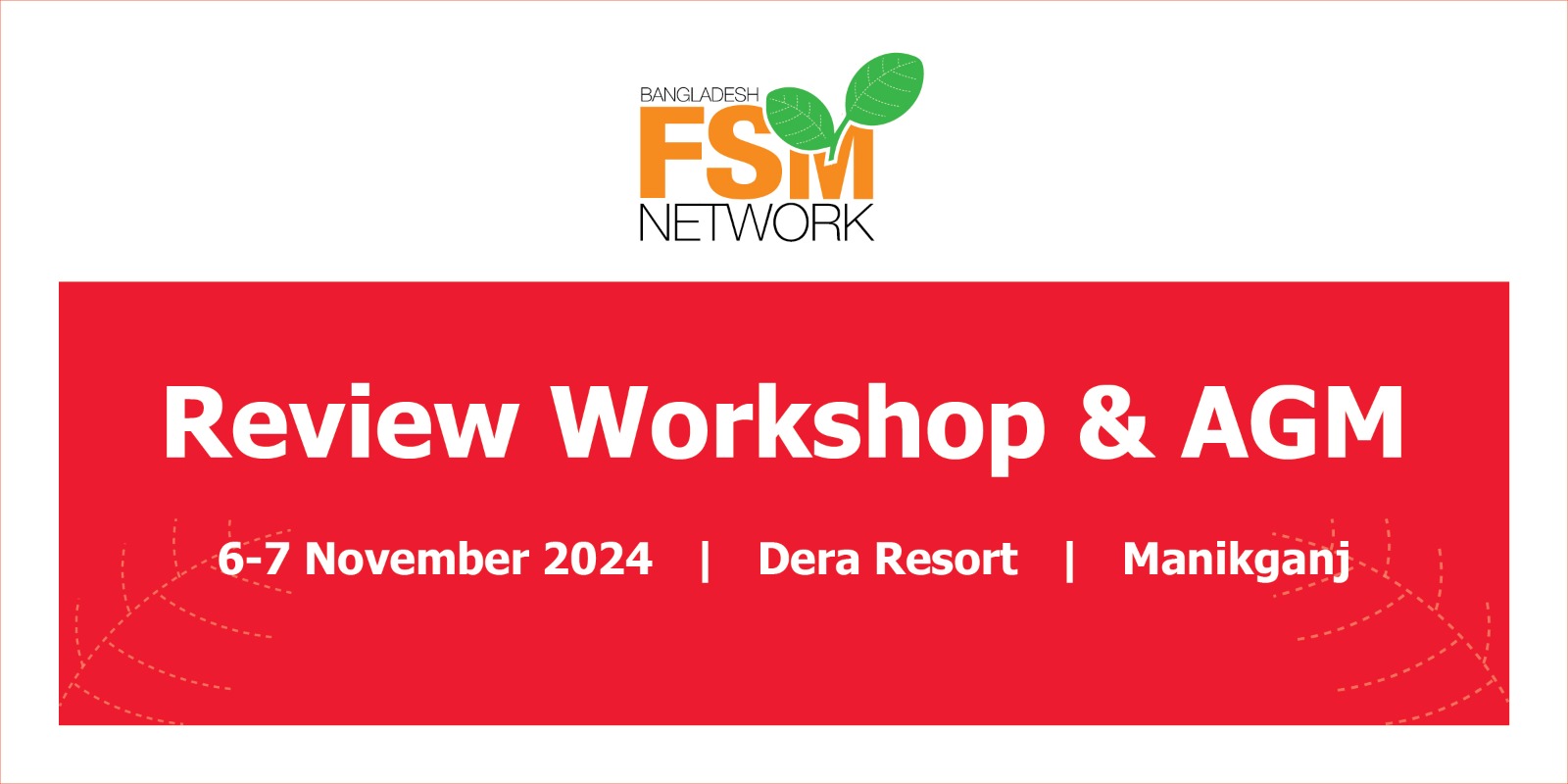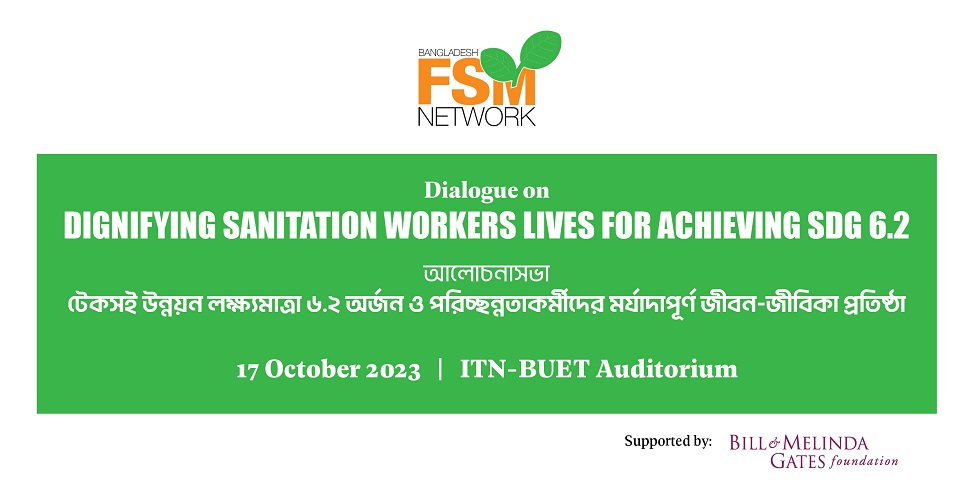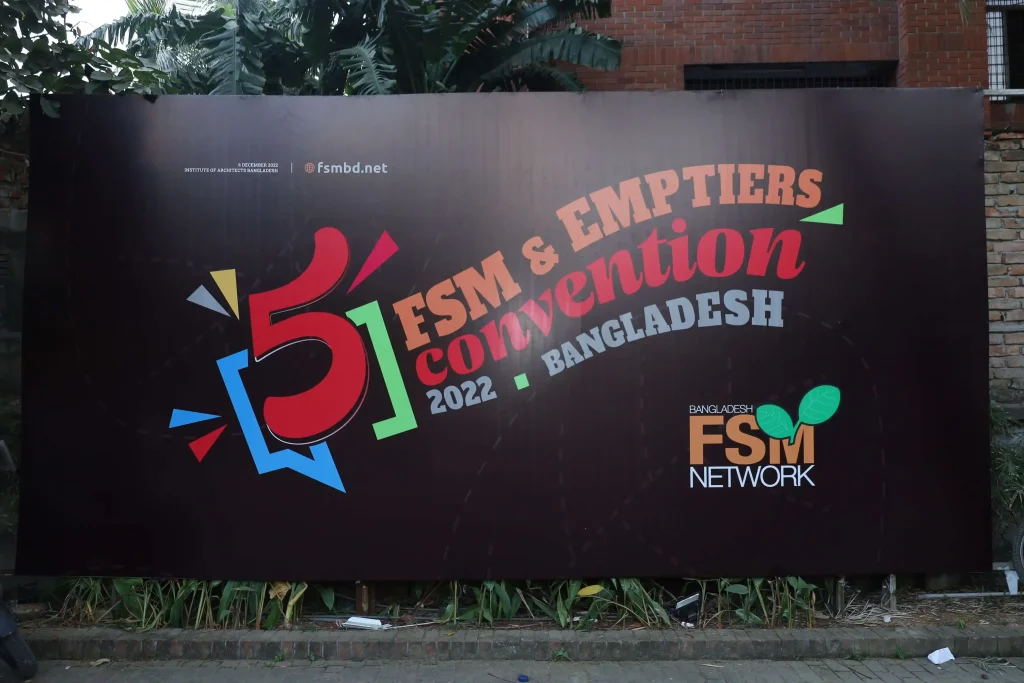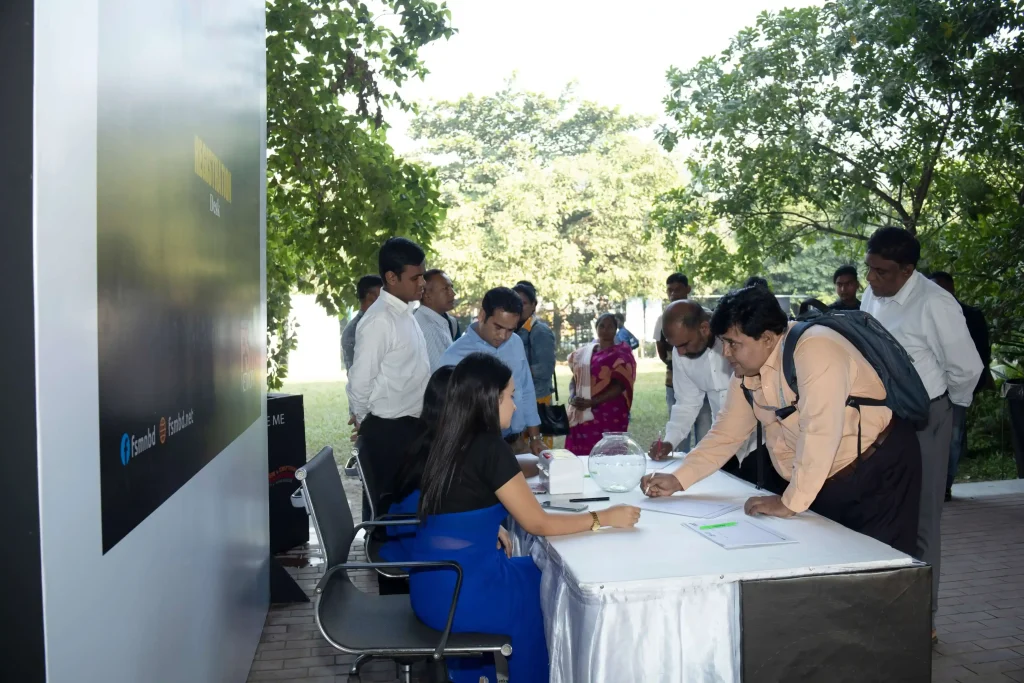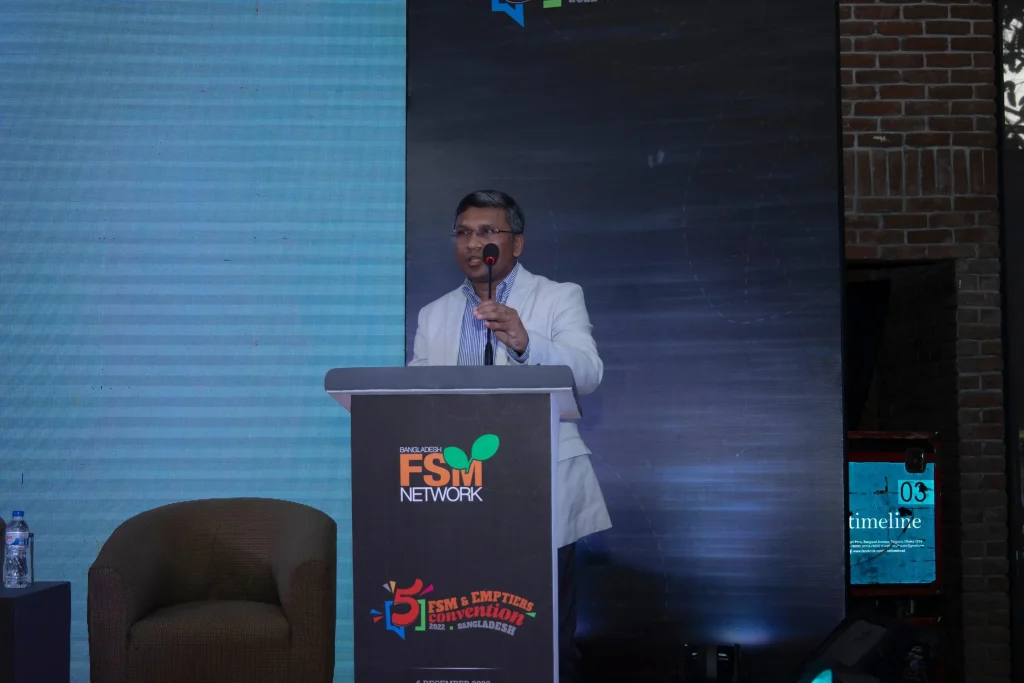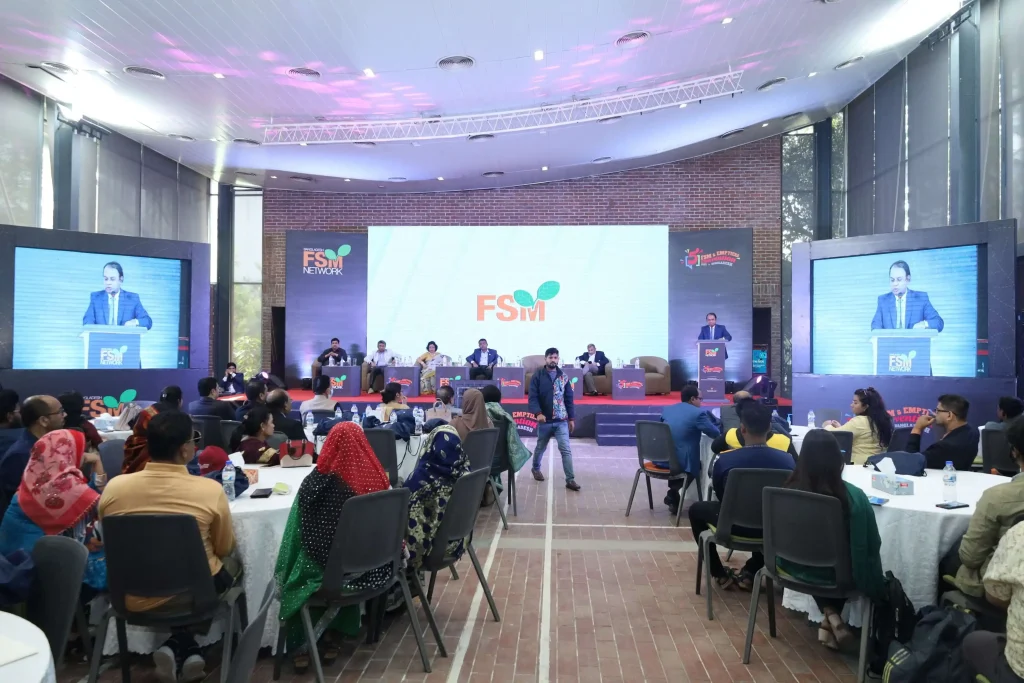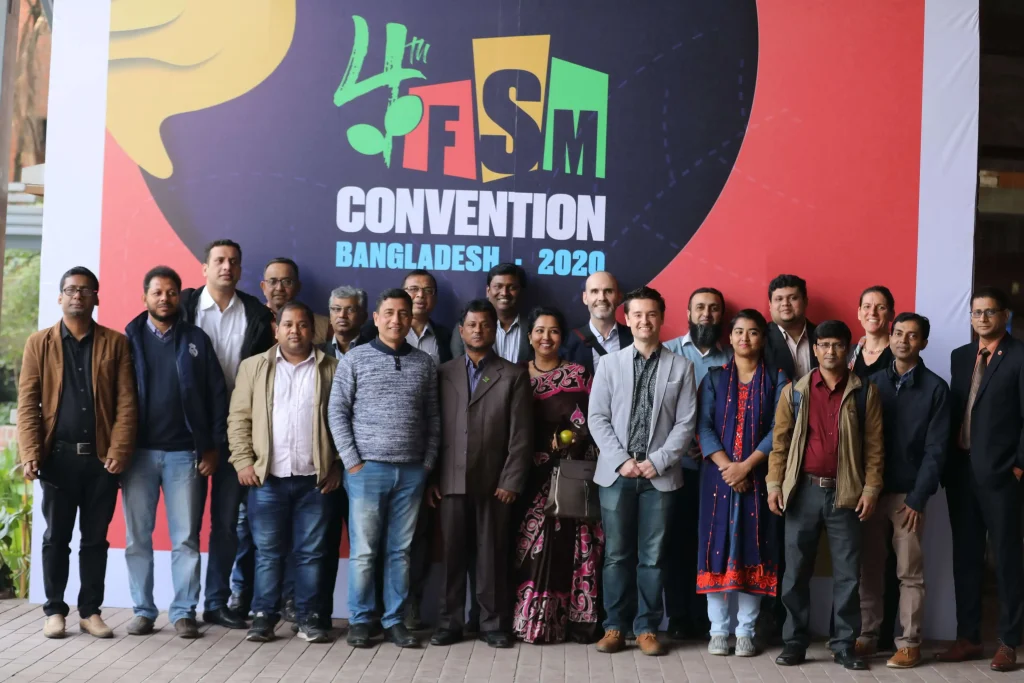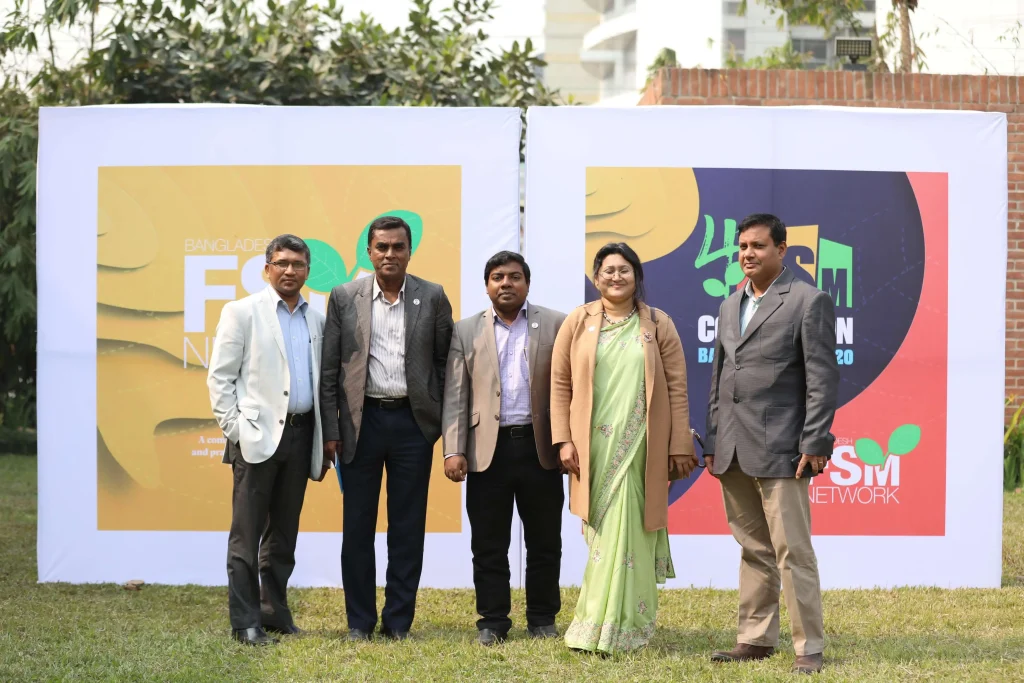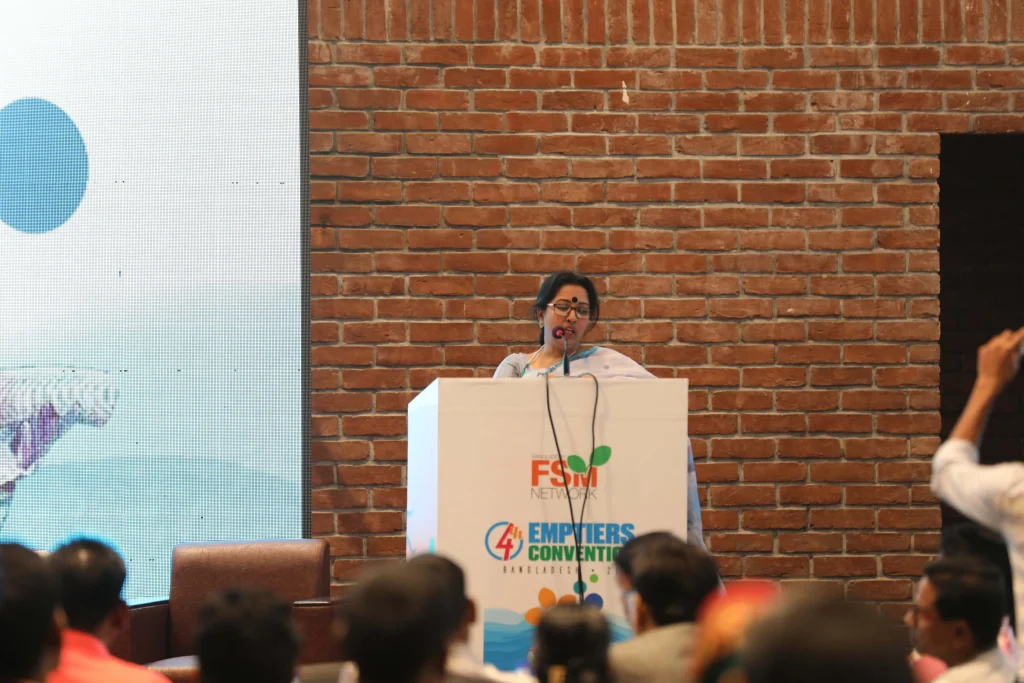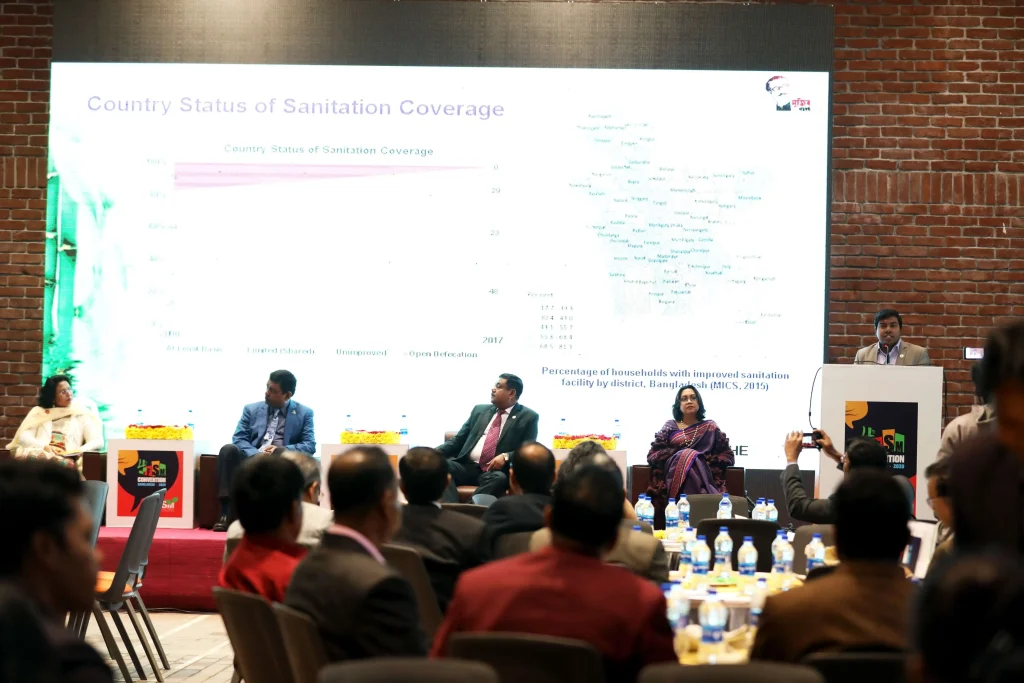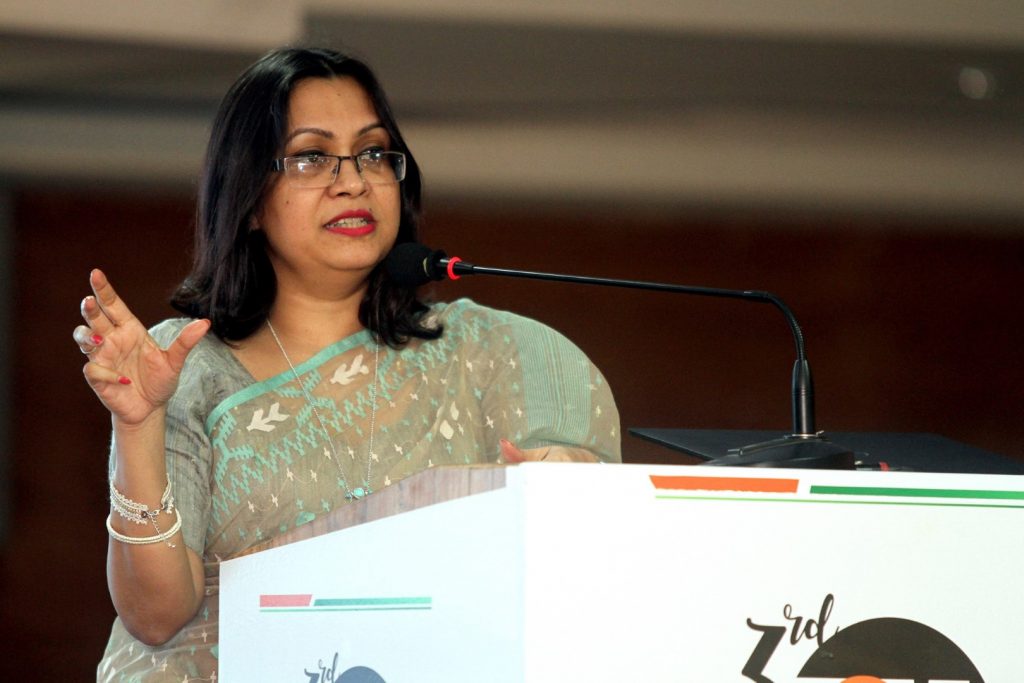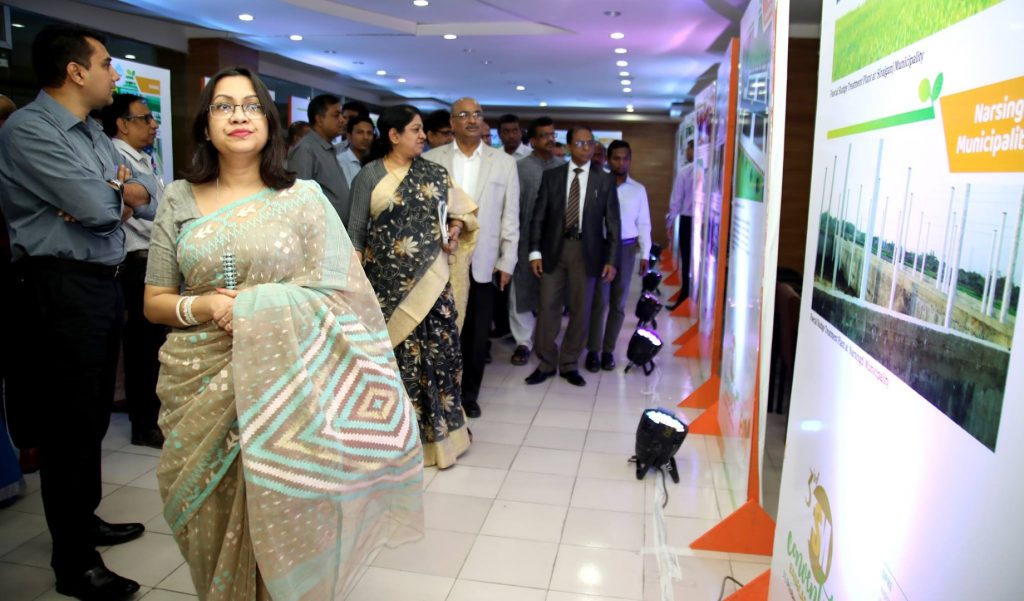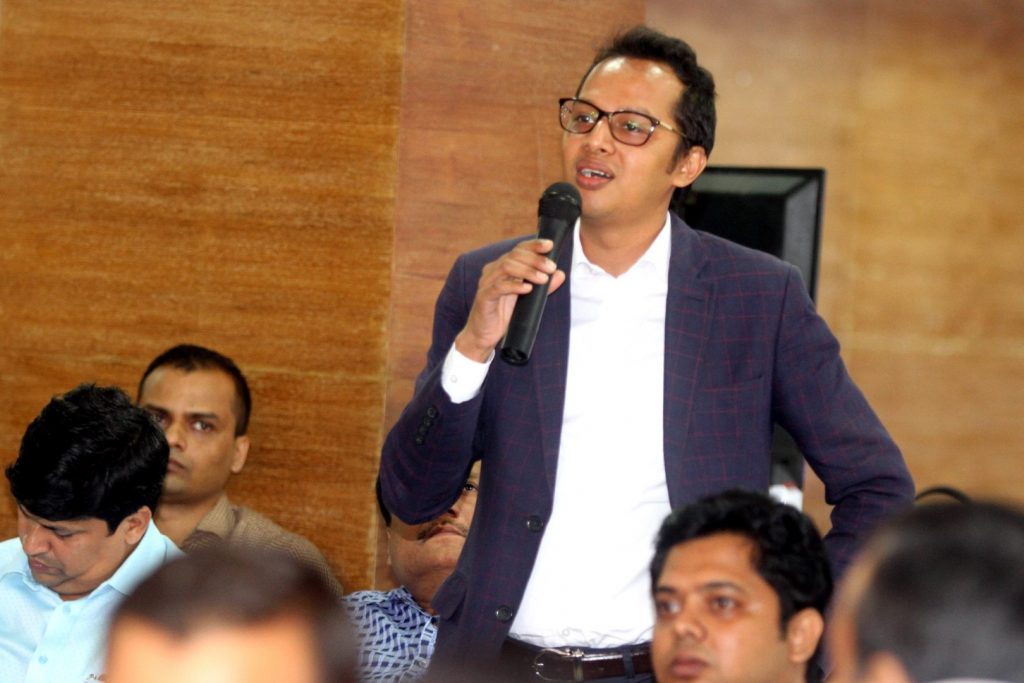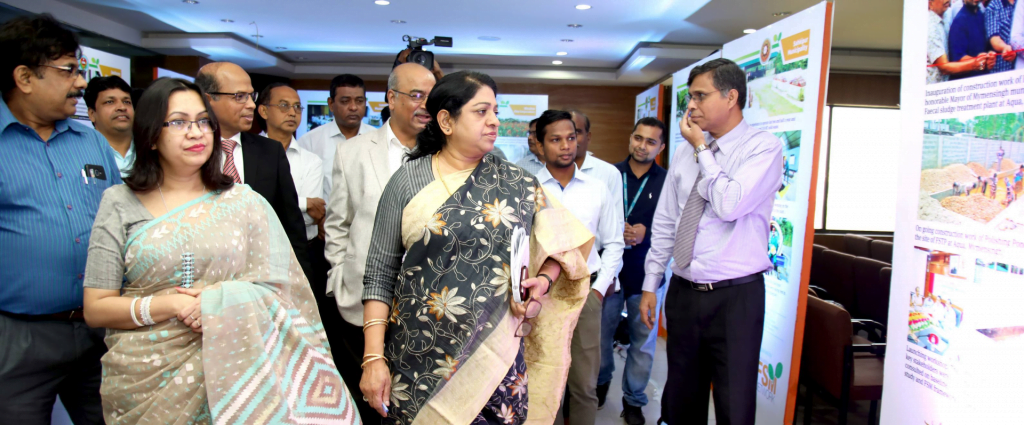FSM for Better Future
Even though Bangladesh has accomplished the incredible achievement of almost eliminating open defecation. However, the rapid expansion of sanitation coverage along with the inadequate ability to cope with fecal sludge management (FSM) results in huge environmental contamination.
FSM in Bangladesh
* Click on the map for details
At a Glance
As of 2020 (JMP data)
Safety Managed Sanitation
39%
Basic service
15%
Limited service
24%
Unimproved
22%
Thakurgaon Paurashava
As on 2020
Area 30.03km2
92 K
Population (in thousand)
26 m3/day
FS Generation
29%
FS Collection
0%
FS Treatment
25
Number of Vacuum Tanker
0
Number of FSTP
15%
Safety Managed Sanitation
31 ton/day
Solid Waste Generation
0%
Solid Waste Collection/day
Panchagarh Paurashava
As on 2020
Area 20.72km2
53 K
Population (in thousand)
13 m3/day
FS Generation
43%
FS Collection
0%
FS Treatment
1
Number of Vacuum Tanker
0
Number of FSTP
16%
Safety Managed Sanitation
18 ton/day
Solid waste generation
78%
Solid Waste Collection/day
Nilphamari Paurashava
As on 2020
Area 19.28km2
54 K
Population (in thousand)
2 m3/day
FS Generation
29%
FS Collection
0%
FS Treatment
0
Number of Vacuum Tanker
0
Number of FSTP
7%
Safety Managed Sanitation
18 ton/day
Solid Waste Generation
89%
Solid Waste Collection/day
Dinajpur Paurashava
As on 2020
Area 21.06km2
214 K
Population (in thousand)
48 m3/day
FS Generation
34%
FS Collection
0%
FS Treatment
0
Number of Vacuum Tanker
0
Number of FSTP
17%
Safety Managed Sanitation
73 ton/day
Solid Waste Generation
49%
Solid Waste Collection/day
Lalmonirhat Paurashava
As on 2020
Area 37.37km2
98 K
Population (in thousand)
28 m3/day
FS Generation
27%
FS Collection
0%
FS Treatment
0
Number of Vacuum Tanker
0
Number of FSTP
7%
Safety Managed Sanitation
25 ton/day
Solid Waste Generation
26%
Solid Waste Collection/day
Rangpur City Corporation
As on 2020
Area 80.69km2
401 K
Population (in thousand)
105 m3/day
FS Generation
35%
FS Collection
0%
FS Treatment
0
Number of Vacuum Tanker
0
Number of FSTP
15%
Safety Managed Sanitation
229 ton/day
Solid Waste Generation
35%
Solid Waste Collection/day
Kurigram Paurashava
As on 2020
Area 27.04km2
92 K
Population (in thousand)
24 m3/day
FS Generation
46%
FS Collection
0%
FS Treatment
1
Number of Vacuum Tanker
0
Number of FSTP
12%
Safety Managed Sanitation
31 ton/day
Solid Waste Generation
42%
Solid Waste Collection/day
Gaibandha Paurashava
As on 2020
Area 11.29km2
75 K
Population (in thousand)
18 m3/day
FS Generation
43%
FS Collection
0%
FS Treatment
0
Number of Vacuum Tanker
0
Number of FSTP
11%
Safety Managed Sanitation
26 ton/day
Solid Waste Generation
88%
Solid Waste Collection/day
Joypurhat Paurashava
As on 2020
Area 18.54km2
84 K
Population (in thousand)
17 m3/day
FS Generation
28%
FS Collection
0%
FS Treatment
0
Number of Vacuum Tanker
0
Number of FSTP
30%
Safety Managed Sanitation
26 ton/day
Solid Waste Generation
65%
Solid Waste Collection/day
Naogaon Paurashava
As on 2020
Area 37.08km2
172 K
Population (in thousand)
40 m3/day
FS Generation
30%
FS Collection
0%
FS Treatment
0
Number of Vacuum Tanker
0
Number of FSTP
19%
Safety Managed Sanitation
59 ton/day
Solid Waste Generation
27%
Solid Waste Collection/day
Chapai Nawabganj Paurashava
As on 2020
Area 32.90km2
238 K
Population (in thousand)
120 m3/day
FS Generation
31%
FS Collection
0%
FS Treatment
0
Number of Vacuum Tanker
1
Number of FSTP
21%
Safety Managed Sanitation
74 ton/day
Solid Waste Generation
57%
Solid Waste Collection/day
Bogura Paurashava
As on 2020
Area 68.63km2
501 K
Population (in thousand)
166 m3/day
FS Generation
46%
FS Collection
0%
FS Treatment
0
Number of Vacuum Tanker
0
Number of FSTP
11%
Safety Managed Sanitation
171 ton/day
Solid Waste Generation
82%
Solid Waste Collection/day
Jamalpur Paurashava
As on 2020
Area 3.16km2
178 K
Population (in thousand)
54 m3/day
FS Generation
39%
FS Collection
68%
FS Treatment
2
Number of Vacuum Tanker
0
Number of FSTP
1%
Safety Managed Sanitation
61 ton/day
Solid Waste Generation
53%
Solid Waste Collection/day
Rajshahi City Corporation
As on 2020
Area 97.18km2
613 K
Population (in thousand)
0m3/day
FS Generation
30%
FS Collection
0%
FS Treatment
0
Number of Vacuum Tanker
0
Number of FSTP
25%
Safety Managed Sanitation
351 ton/day
Solid Waste Generation
75%
Solid Waste Collection/day
Natore Paurashava
As on 2020
Area 14.84km2
101 K
Population (in thousand)
23 m3/day
FS Generation
35%
FS Collection
0%
FS Treatment
4
Number of Vacuum Tanker
0
Number of FSTP
12%
Safety Managed Sanitation
35 ton/day
Solid Waste Generation
91%
Solid Waste Collection/day
Sirajgonj Paurashava
As on 2020
Area 28.49km2
198 K
Population (in thousand)
39 m3/day
FS Generation
39%
FS Collection
0%
FS Treatment
0
Number of Vacuum Tanker
0
Number of FSTP
18%
Safety Managed Sanitation
68 ton/day
Solid Waste Generation
88%
Solid Waste Collection/day
Pabna Paurashava
As on 2020
Area 27.27km2
198 K
Population (in thousand)
40 m3/day
FS Generation
35%
FS Collection
0%
FS Treatment
0
Number of Vacuum Tanker
0
Number of FSTP
2%
Safety Managed Sanitation
103 ton/day
Solid Waste Generation
52%
Solid Waste Collection/day
Sherpur Paurashava
As on 2020
Area 24.92km2
123 K
Population (in thousand)
28 m3/day
FS Generation
43%
FS Collection
0%
FS Treatment
0
Number of Vacuum Tanker
0
Number of FSTP
15%
Safety Managed Sanitation
38 ton/day
Solid Waste Generation
68%
Solid Waste Collection/day
Mymensingh City Corporation
As on 2020
Area 105.29km2
767 K
Population (in thousand)
186 m3/day
FS Generation
30%
FS Collection
0%
FS Treatment
0
Number of Vacuum Tanker
0
Number of FSTP
20%
Safety Managed Sanitation
399 ton/day
Solid Waste Generation
58%
Solid Waste Collection/day
Netrokona Paurashava
As on 2020
Area 29.38 km2
121 K
Population (in thousand)
31 m3/day
FS Generation
55%
FS Collection
0%
FS Treatment
0
Number of Vacuum Tanker
0
Number of FSTP
15%
Safety Managed Sanitation
37 ton/day
Solid Waste Generation
35%
Solid Waste Collection/day
Sunamganj Paurashava
As on 2020
Area 17.31 km2
75 K
Population (in thousand)
14 m3/day
FS Generation
19%
FS Collection
0%
FS Treatment
1
Number of Vacuum Tanker
0
Number of FSTP
15%
Safety Managed Sanitation
25 ton/day
Solid Waste Generation
71%
Solid Waste Collection/day
Sylhet Paurashava
As on 2020
Area 26.50 km2
659 K
Population (in thousand)
129 m3/day
FS Generation
30%
FS Collection
0%
FS Treatment
0
Number of Vacuum Tanker
0
Number of FSTP
23%
Safety Managed Sanitation
343 ton/day
Solid Waste Generation
76%
Solid Waste Collection/day
Maulavibazar Paurashava
As on 2020
Area 10.36 km2
77 K
Population (in thousand)
22 m3/day
FS Generation
62%
FS Collection
0%
FS Treatment
0
Number of Vacuum Tanker
0
Number of FSTP
11%
Safety Managed Sanitation
26 ton/day
Solid Waste Generation
88%
Solid Waste Collection/day
Habiganj Paurashava
As on 2020
Area 8.97 km2
94 K
Population (in thousand)
25 m3/day
FS Generation
64%
FS Collection
0%
FS Treatment
0
Number of Vacuum Tanker
0
Number of FSTP
10%
Safety Managed Sanitation
29 ton/day
Solid Waste Generation
69%
Solid Waste Collection/day
Kishorganj Paurashava
As on 2020
Area 15.57 km2
130 K
Population (in thousand)
33 m3/day
FS Generation
42%
FS Collection
0%
FS Treatment
0
Number of Vacuum Tanker
0
Number of FSTP
8%
Safety Managed Sanitation
44 ton/day
Solid Waste Generation
75%
Solid Waste Collection/day
Gazipur City Corporation
As on 2020
Area 321 km2
2170 K
Population (in thousand)
452 m3/day
FS Generation
38%
FS Collection
0%
FS Treatment
3
Number of Vacuum Tanker
0
Number of FSTP
16%
Safety Managed Sanitation
1354 ton/day
Solid Waste Generation
80%
Solid Waste Collection/day
Narsingdi Paurashava
As on 2020
Area 14.75 km2
179 K
Population (in thousand)
35 m3/day
FS Generation
52%
FS Collection
0%
FS Treatment
0
Number of Vacuum Tanker
0
Number of FSTP
2%
Safety Managed Sanitation
102 ton/day
Solid Waste Generation
55%
Solid Waste Collection/day
Brahmanbaria Paurashava
As on 2020
Area 17.60 km2
206 K
Population (in thousand)
48 m3/day
FS Generation
38%
FS Collection
0%
FS Treatment
1
Number of Vacuum Tanker
0
Number of FSTP
5%
Safety Managed Sanitation
70 ton/day
Solid Waste Generation
64%
Solid Waste Collection/day
Tangail Paurashava
As on 2020
Area 33.45 km2
200 K
Population (in thousand)
50 m3/day
FS Generation
39%
FS Collection
0%
FS Treatment
1
Number of Vacuum Tanker
0
Number of FSTP
11%
Safety Managed Sanitation
68 ton/day
Solid Waste Generation
60%
Solid Waste Collection/day
Manikganj Paurashava
As on 2020
Area 23.13 km2
86 K
Population (in thousand)
30 m3/day
FS Generation
35%
FS Collection
0%
FS Treatment
0
Number of Vacuum Tanker
0
Number of FSTP
7%
Safety Managed Sanitation
29 ton/day
Solid Waste Generation
69%
Solid Waste Collection/day
Narayanganj City Corporation
As on 2020
Area 72.43 km2
2000 K
Population (in thousand)
411 m3/day
FS Generation
34%
FS Collection
0%
FS Treatment
5
Number of Vacuum Tanker
0
Number of FSTP
2%
Safety Managed Sanitation
1144 ton/day
Solid Waste Generation
17%
Solid Waste Collection/day
Munshiganj Paurashava
As on 2020
Area 17.74 km2
84 K
Population (in thousand)
21 m3/day
FS Generation
44%
FS Collection
0%
FS Treatment
0
Number of Vacuum Tanker
0
Number of FSTP
13%
Safety Managed Sanitation
29 ton/day
Solid Waste Generation
72%
Solid Waste Collection/day
Kushtia Paurashava
As on 2020
Area 13.32 km2
123 K
Population (in thousand)
32 m3/day
FS Generation
51%
FS Collection
41%
FS Treatment
0
Number of Vacuum Tanker
1
Number of FSTP
26%
Safety Managed Sanitation
42 ton/day
Solid Waste Generation
48%
Solid Waste Collection/day
Rajbari Paurashava
As on 2020
Area 12.66 km2
61 K
Population (in thousand)
14 m3/day
FS Generation
37%
FS Collection
0%
FS Treatment
1
Number of Vacuum Tanker
0
Number of FSTP
10%
Safety Managed Sanitation
21 ton/day
Solid Waste Generation
95%
Solid Waste Collection/day
Faridpur Paurashava
As on 2020
Area 19.07 km2
164 K
Population (in thousand)
34 m3/day
FS Generation
49%
FS Collection
70%
FS Treatment
0
Number of Vacuum Tanker
0
Number of FSTP
36%
Safety Managed Sanitation
51 ton/day
Solid Waste Generation
94%
Solid Waste Collection/day
Meherpur Paurashava
As on 2020
Area 15.90 km2
47 K
Population (in thousand)
12 m3/day
FS Generation
37%
FS Collection
0%
FS Treatment
0
Number of Vacuum Tanker
0
Number of FSTP
10%
Safety Managed Sanitation
16 ton/day
Solid Waste Generation
94%
Solid Waste Collection/day
Chuadanga Paurashava
As on 2020
Area 37.37 km2
98 K
Population (in thousand)
28 m3/day
FS Generation
27%
FS Collection
0%
FS Treatment
0
Number of Vacuum Tanker
0
Number of FSTP
9%
Safety Managed Sanitation
38 ton/day
Solid Waste Generation
64%
Solid Waste Collection/day
Jhenaidha Paurashava
As on 2020
Area 40.86 km2
129 K
Population (in thousand)
34 m3/day
FS Generation
48%
FS Collection
78%
FS Treatment
1
Number of Vacuum Tanker
1
Number of FSTP
29%
Safety Managed Sanitation
44 ton/day
Solid Waste Generation
32%
Solid Waste Collection/day
Magura Paurashava
As on 2020
Area 43.92 km2
112 K
Population (in thousand)
12 m3/day
FS Generation
47%
FS Collection
0%
FS Treatment
1
Number of Vacuum Tanker
0
Number of FSTP
8%
Safety Managed Sanitation
38 ton/day
Solid Waste Generation
47%
Solid Waste Collection/day
Madaripur Paurashava
As on 2020
Area 14.22 km2
69 K
Population (in thousand)
15 m3/day
FS Generation
45%
FS Collection
0%
FS Treatment
0
Number of Vacuum Tanker
0
Number of FSTP
16%
Safety Managed Sanitation
23 ton/day
Solid Waste Generation
78%
Solid Waste Collection/day
Shariatpur Paurashava
As on 2020
Area 24.92 km2
54 K
Population (in thousand)
13 m3/day
FS Generation
45%
FS Collection
0%
FS Treatment
0
Number of Vacuum Tanker
0
Number of FSTP
13%
Safety Managed Sanitation
18 ton/day
Solid Waste Generation
49%
Solid Waste Collection/day
Jessore Paurashava
As on 2020
Area 14.71 km2
229 K
Population (in thousand)
60 m3/day
FS Generation
50%
FS Collection
16%
FS Treatment
0
Number of Vacuum Tanker
1
Number of FSTP
20%
Safety Managed Sanitation
78 ton/day
Solid Waste Generation
69%
Solid Waste Collection/day
Narail Paurashava
As on 2020
Area 26.90 km2
46 K
Population (in thousand)
24 m3/day
FS Generation
42%
FS Collection
0%
FS Treatment
0
Number of Vacuum Tanker
0
Number of FSTP
12%
Safety Managed Sanitation
16 ton/day
Solid Waste Generation
38%
Solid Waste Collection/day
Gopalganj Paurashava
As on 2020
Area 14.25 km2
59 K
Population (in thousand)
16 m3/day
FS Generation
60%
FS Collection
0%
FS Treatment
0
Number of Vacuum Tanker
0
Number of FSTP
19%
Safety Managed Sanitation
20 ton/day
Solid Waste Generation
75%
Solid Waste Collection/day
Satkhira Paurashava
As on 2020
Area 32.39 km2
130 K
Population (in thousand)
33 m3/day
FS Generation
40%
FS Collection
0%
FS Treatment
0
Number of Vacuum Tanker
0
Number of FSTP
17%
Safety Managed Sanitation
44 ton/day
Solid Waste Generation
25%
Solid Waste Collection/day
Barisal City Corporation
As on 2020
Area 58.05 km2
392 K
Population (in thousand)
101 m3/day
FS Generation
49%
FS Collection
0%
FS Treatment
1
Number of Vacuum Tanker
0
Number of FSTP
21%
Safety Managed Sanitation
224 ton/day
Solid Waste Generation
83%
Solid Waste Collection/day
Bagerhat Paurashava
As on 2020
Area 7.53 km2
54 K
Population (in thousand)
14 m3/day
FS Generation
59%
FS Collection
0%
FS Treatment
0
Number of Vacuum
0
Number of FSTP
19%
Safety Managed Manitation
24 ton/day
Solid Waste Generation
75%
Solid Waste Collection/day
Pirojpur Paurashava
As on 2020
Area 29.49 km2
66 K
Population (in thousand)
20 m3/day
FS Generation
50%
FS Collection
0%
FS Treatment
1
Number of Vacuum Tanker
0
Number of FSTP
12%
Safety Managed Sanitation
22 ton/day
Solid waste generation
45%
Solid Waste Collection/day
Barguna Paurashava
As on 2020
Area 15.57 km2
41 K
Population (in thousand)
11 m3/day
FS Generation
50%
FS Collection
0%
FS Treatment
0
Number of Vacuum Tanker
0
Number of FSTP
9%
Safety Managed Sanitation
17 ton/day
Solid Waste Generation
88%
Solid Waste Collection/day
Jhalokathi Paurashava
As on 2020
Area 16.13 km2
62 K
Population (in thousand)
19 m3/day
FS Generation
44%
FS Collection
0%
FS Treatment
1
Number of Vacuum Tanker
0
Number of FSTP
8%
Safety Managed Sanitation
21 ton/day
Solid Waste Generation
52%
Solid Waste Collection/day
Patuakhali Paurashava
As on 2020
Area 12.66 km2
82 K
Population (in thousand)
21 m3/day
FS Generation
48%
FS Collection
0%
FS Treatment
0
Number of Vacuum Tanker
0
Number of FSTP
14%
Safety Managed Sanitation
34 ton/day
Solid Waste Generation
82%
Solid Waste Collection/day
Bhola Paurashava
As on 2020
Area 22.66 km2
60 K
Population (in thousand)
14 m3/day
FS Generation
46%
FS Collection
0%
FS Treatment
0
Number of Vacuum Tanker
0
Number of FSTP
10%
Safety Managed Sanitation
19 ton/day
Solid Waste Generation
84%
Solid Waste Collection/day
Chandpur Paurashava
As on 2020
Area 22.90 km2
174 K
Population (in thousand)
31 m3/day
FS Generation
34%
FS Collection
0%
FS Treatment
0
Number of Vacuum Tanker
0
Number of FSTP
7%
Safety Managed Sanitation
59 ton/day
Solid Waste Generation
59%
Solid Waste Collection/day
Comilla City Corporation
As on 2020
Area 42.34 km2
445 K
Population (in thousand)
56 m3/day
FS Generation
55%
FS Collection
0%
FS Treatment
0
Number of Vacuum Tanker
0
Number of FSTP
9%
Safety Managed Sanitation
254 ton/day
Solid Waste Generation
43%
Solid Waste Collection/day
Lakshmipur Paurashava
As on 2020
Area 26.90 km2
147 K
Population (in thousand)
39 m3/day
FS Generation
57%
FS Collection
0%
FS Treatment
0
Number of Vacuum Tanker
0
Number of FSTP
27%
Safety Managed Sanitation
50 ton/day
Solid Waste Generation
34%
Solid Waste Collection/day
Noakhali Paurashava
As on 2020
Area 16.67 km2
120 K
Population (in thousand)
35 m3/day
FS Generation
57%
FS Collection
0%
FS Treatment
0
Number of Vacuum Tanker
0
Number of FSTP
12%
Safety Managed Sanitation
41 ton/day
Solid Waste Generation
93%
Solid Waste Collection/day
Feni Paurashava
As on 2020
Area 21.61km2
213 K
Population (in thousand)
56 m3/day
FS Generation
53%
FS Collection
0%
FS Treatment
0
Number of Vacuum Tanker
0
Number of FSTP
4%
Safety Managed Sanitation
73 ton/day
Solid Waste Generation
81%
Solid Waste Collection/day
Khagrachari Paurashava
As on 2020
Area 29.49 km2
59 K
Population (in thousand)
13 m3/day
FS Generation
32%
FS Collection
0%
FS Treatment
0
Number of Vacuum Tanker
1
Number of FSTP
18%
Safety Managed Sanitation
20 ton/day
Solid Waste Generation
90%
Solid Waste Collection/day
Rangamati Paurashava
As on 2020
Area 64.76 km2
103 K
Population (in thousand)
29 m3/day
FS Generation
30%
FS Collection
0%
FS Treatment
1
Number of Vacuum Tanker
0
Number of FSTP
13%
Safety Managed Sanitation
35 ton/day
Solid Waste Generation
51%
Solid Waste Collection/day
Bandarban Paurashava
As on 2020
Area 13.05 km2
60 K
Population (in thousand)
11 m3/day
FS Generation
31%
FS Collection
0%
FS Treatment
0
Number of Vacuum Tanker
0
Number of FSTP
15%
Safety Managed Sanitation
18 ton/day
Solid Waste Generation
89%
Solid Waste Collection/day
Cox's Bazar Paurashava
As on 2020
Area 32.90 km2
259 K
Population (in thousand)
86 m3/day
FS Generation
48%
FS Collection
0%
FS Treatment
0
Number of Vacuum Tanker
0
Number of FSTP
5%
Safety Managed Sanitation
104 ton/day
Solid Waste Generation
70%
Solid Waste Collection/day
Dhaka City Corporation
Chittagong City Corporation
Khulna City Corporation
About Us
Bangladesh Faecal Sludge Management Network is a common and collective platform for the sector actors to generate ideas, share views, influence policy and practice, and raise a collective voice to meet the challenges of sanitation sector.











Vision

Vision
Ensuring a safe and sustainable faecal sludge management system in Bangladesh for improved public health and living environment for all by 2030

Mission

Mission
To act as a knowledge and advocacy platform where FSM is an intermediary solution for influencing policy and changes in practice for access to adequate, equitable and improved sanitation

Objectives

Objectives
1
To work in a collaborative learning approach with all stakeholders to capture evidence, communicate knowledge and facilitate sector capacity building.
2
To engage and provide strategic guidance to the FSM stakeholders for advancing appropriate technologies and approaches for safe and sustainable management of faecal sludge.

Priorities

Priorities
1
Improve waste and sanitation workers’ quality of life and livelihood – with a particular focus on ensuring gender equity
2
Encourage uptake and integration of City-Wide Inclusive Sanitation (CWIS) approaches in National and City/Municipality programmes for sustainable sanitation
3
Develop alternative approaches for sanitation financing – including opportunities to promote city wide sanitation tax
4
Drive private sector engagement in urban sanitation value chain and faecal sludge management
5
Advance faecal sludge management standardisation and certification processes for both service processes and end use products.
News

Gender and WASH roundtable in India
Uttam Kumar Saha, from FSM Network and Practical Action, had the privilege of participating in

Tackling the environmental challenges in Cox’s Bazar
Having just returned from a scoping mission to Cox's Bazar to see the environmental situation

Waste could save our soil
With rising concerns about the condition of soil fertility in Bangladesh, various stakeholders are trying




